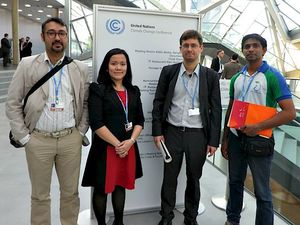
SWITCH-Asia brings the role of SMEs into international climate change negotiations.
While governments negotiate a new global climate change regime to be agreed on in Paris at the end of 2015, climate actions by non-state actors are already laying the groundwork for keeping the planet’s temperature below 2 degrees of warming.
Small and medium size enterprises (SMEs) are without doubt one of the main actors which need to be involved for effective climate action.
This point was emphasised by the SWITCH-Asia Programme during the workshop “Catalyzing Climate Action for Resilient Development”, hosted in Bonn on 5 June 2015 by the German Development Institute (D.I.E.), The Energy and Resources Institute (TERI) and the “Galvanizing the Groundswell of Climate Actions” dialogue series.
The workshop contributed to “Momentum for Change”, an initiative spearheaded by the UN Climate Change Secretariat (UNFCCC), to shine a light on the enormous groundswell of activities underway across the globe that are moving the world toward a highly resilient, low-carbon future.
The importance of resilience is increasingly highlighted in the climate change context, which often only focuses on mitigation issues. Similarly, the workshop emphasised the growing importance of resilience for climate action. The approaches used to promote sustainable consumption and production (SCP), have multiple lessons to share, which could be relevant in this context.
According to Patrick Schroeder, SCP Expert of the SWITCH-Asia Network Facility, “SWITCH-Asia grant projects already go beyond the simple focus on low-carbon only, but implement activities in a holistic approach to address climate change. Project impacts include benefits for local communities, increased incomes for workers, sustainable use of renewable resources, enhanced competitiveness of SMEs – in addition to GHG emission reductions.”
Ahmad ur Rehmann Hafiz, consultant of the Collaborating Center on Sustainable Consumption and Production (CSCP), highlighted the achievements of the SWITCH-Asia Sci-Pak project in Pakistan, which implemented a range of energy and resource efficiency initiatives in the country’s textile and tannery sectors.
(To view his presentation, click here.)
